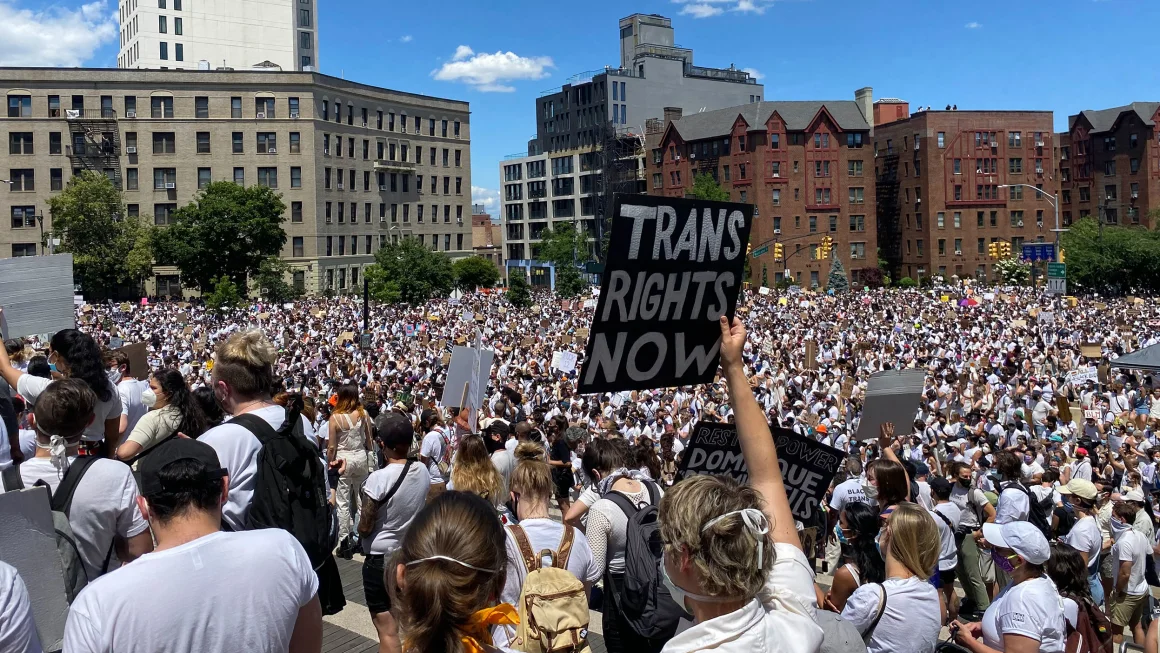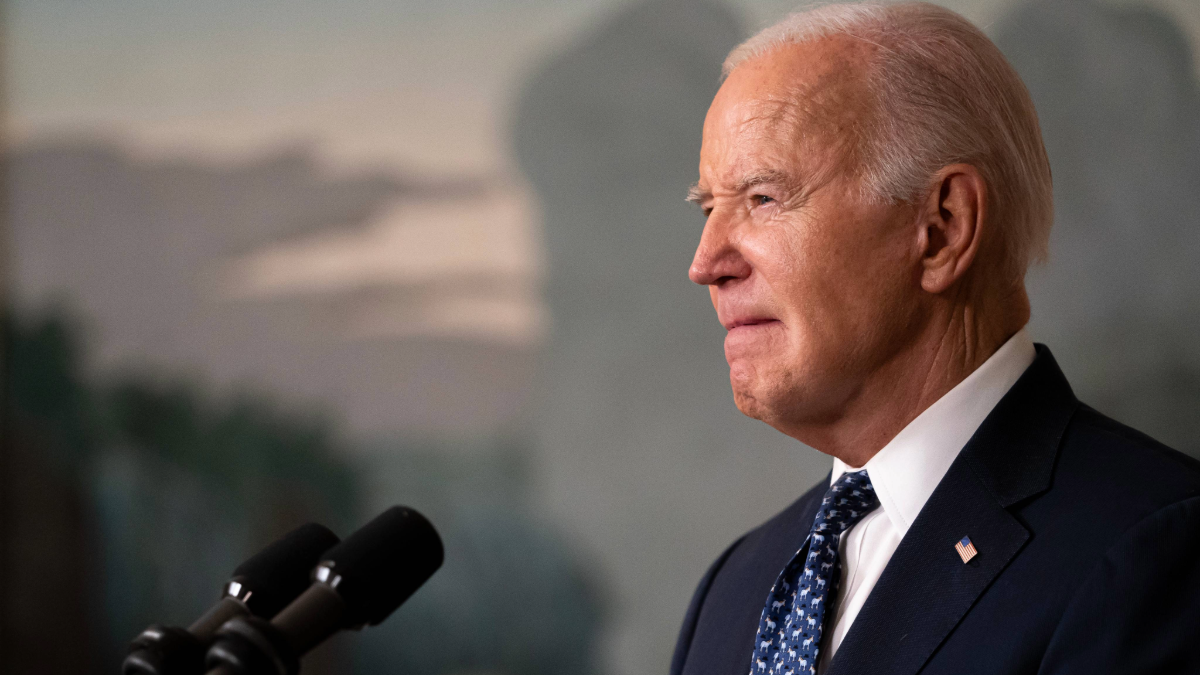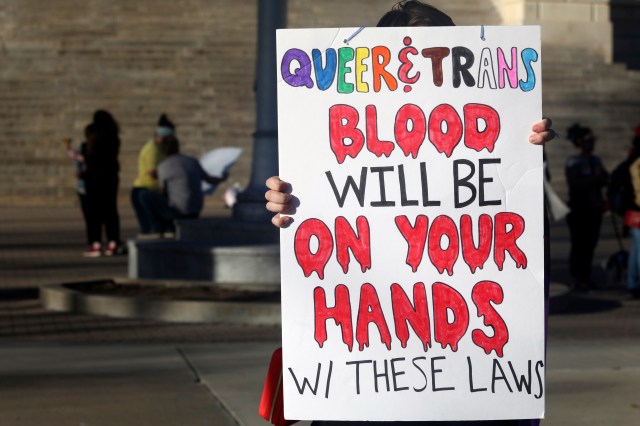
The following speech was given during a rally at Columbia University for International Women’s Day.
This International Working Women’s Day, I come to you as a woman, lesbian, revolutionary Trotskyist, to implore us all to join the fight of our trans siblings and comrades in the fight for bodily autonomy and justice for people of all marginalized genders. I am a member of Left Voice, which is part of the Trotskyist Fraction in 14 countries, including Argentina and Mexico. Our tradition has been a part of the struggle in the streets for abortion rights and as part of the internationalist feminist group Pan y Rosas, or Bread and Roses. Here in the U.S., there are currently 479 active anti-trans bills, attacking basic health care, education, legal recognition, and the right for trans people to publicly exist. According to statistics from the Trevor Project, fewer than one in three trans and nonbinary youth found their homes to be affirming, and nearly one in five transgender and nonbinary youth attempted suicide in the past year.
As a former educator, and current social work intern at a school, I have seen how deeply entrenched transphobia harms our youth and prevents them from living the rich, full lives that they deserve to live. In Argentina in 2015, thousands of protesters filled the streets of Buenos Aires, angry about the shocking murder of a woman at the hands of her male partner. They were outraged at the prevalence of femicide and sexist violence, and raised the slogan “Ni una menos” — not one less, lost to patriarchal violence. The same patriarchal violence that kills cis women kills our trans sisters like Brianna Ghey and nonbinary siblings like Nex Benedict. Another slogan the movement eventually took up was “Vivas nos queremos” (We want us alive).
I want every trans child, adolescent, and adult to be alive. I want every trans child, adolescent, and adult to be free from discrimination in their schools and workplaces, to have access to free gender-affirming care, to have their material needs met, and not be subjected to some of the worst evils under capitalism.
But how do we do that? How do we actually put forward a militant fight when we are being asked to vote for Genocide Joe as the lesser evil in an attempt to preserve the right to abortion (which was decimated under Democrats) and to protect queer and trans rights, when the highest number of anti-queer and anti-trans legislation bills have been introduced under a Democratic presidency? Not to mention that seeing Biden as a lesser evil requires ignoring the genocide of Palestinians. How can we purport to protect limited queer and trans rights for people domestically while ignoring the genocide affecting queer and trans Palestinians abroad?
We do so using working-class methods and strategy. To illustrate this, I want to present the example of Madygraf, a worker-controlled factory cooperative near Buenos Aires in Argentina. The factory used to be owned by the Chicago-based Donnelley Corporation. The bosses had a sexist policy of hiring only men to work the printing presses. One worker was a trans woman, and she had gotten the job only by wearing men’s clothes to work — a sign of the economic desperation that forces trans people to choose between making enough to survive and living in the world as themselves. When she came to work in her normal clothes for the first time, the bosses objected. They tried to prevent her from using the women’s bathroom (which was reserved for white-collar workers), and they forced her to change with the men.
The workers’ council argued against this blatant transphobia in an assembly, which voted to support their colleague’s right to express her gender identity. Donnelley had no changing rooms or bathrooms for women, so the workers’ council demanded that these be constructed. They also demanded that their trans coworker be allowed to use the women’s bathroom. Spaces like assemblies, organized from below by rank-and-file members, are the kind of democracy that people like Joe Biden don’t like to talk about, because these organs of democracy and self-organization are spaces where workers, students, and community members can truly make their own decisions.
One might ask, why were workers so militant in their fight for their trans colleague to use the bathroom? Don’t workers only fight for bread-and-butter demands like fair wages or better working conditions? This speaks to the importance of having an independent working-class party that fights for revolutionary socialism. A Trotskyist party, the Party of Socialist Workers (PTS), had been working in Donnelley for many years. They built up an anti-bureaucratic, class struggle tendency in the workforce that won a majority on the workers’ council. They defended the principles of class independence, workers’ democracy, and feminism. Thanks to years of discussions with Trotskyists, many Donnelley workers understood that to defend their interests, they needed to fight every kind of oppression.
In 2011, a Women’s Commission formed. One of its key principles was solidarity: that no worker and no family should be left to shoulder their burdens alone. The commission, primarily composed of the partners of men working at the plant, helped to bridge the divisions between male workers involved in strikes or politics and their families. The Women’s Commission understood that when men choose to strike and forgo a paycheck, their partners carried the heavy burden of feeding the family, soothing hungry children, and worrying about money for rent, clothes, school supplies, and all the other budget items essential to the family’s survival. When Donnelley owned the factory, the Women’s Commission was not even allowed to enter the factory.
After the fight for the rights of the trans colleague to be able to use the women’s bathroom, the management planned to fire 123 of the plant’s 400 workers. The victory against their bosses in the fight for trans rights gave workers confidence in their own strength and cemented their understanding of the need to act collectively and decisively to win their demands. Workers launched an occupation of the factory, and on August 12, 2014, the factory workers took the plant over and since then have continued production under their own management. Today, the former boardroom for management at the factory has been turned into a center to provide free childcare. Many of the women on the commission have been hired and currently work at the factory, reversing the bosses’ sexist hiring policy. All workers at Madygraf today enjoy an eight-hour workday, higher wages, and lasting job security.
There is a public imagination that the fight for trans rights and womens’ rights is separate from the fight of the working class. However, oppression separates the working class, and the fight against oppression unites it, from fighting for women’s rights to trans rights to the rights of Black, Latine, and Indigenous people. The fight for the rights of a trans woman colleague to use the womens’ bathroom was not won through bourgeois elected officials or through the efforts of the nonprofit industrial complex, which is funded by capitalist parties. As workers, many of whom are trans, queer, women, Black, and Brown, we are the people who make things run. The way that we will fight for our liberation must not be watered down by the Democrats or Republicans or the NGO bureaucracies that offer us piecemeal reforms. And it’s not enough for us to just denounce the capitalist parties, regimes, and apparatuses, whether they are here or around the world.
In this moment when the genocide in Gaza is ongoing, affecting women, trans, nonbinary, and queer folks, etc., we must fight not only for a ceasefire but for a workers’ and socialist Palestine, using our power to shut it down, not only on the streets but in our workplaces, against the nonprofit and labor bureaucracies. We don’t have illusions in pressuring Democrats toward that end. As we saw during BLM, the Democrats just want to channel us to the ballot box to get us off the streets. We know that the root of our problems, from women’s oppression to imperialist oppression, is capitalism, so we have to overthrow this system and fight for a socialist one, not a theocracy or a supposedly more progressive capitalist regime. Against pessimism and capitalist despair, we have faith in the working class around the world to unite its struggles and use its objective power to build this socialist society.
We must fight from where we have the most power — as workers, or professors, or students, or healthcare workers, in our schools, workplaces, and on the streets. We must fight for these rights using our own organizations, not in ones co-opted by bourgeois politicians who are happy to continue to let people of marginalized genders die and restrict our bodily autonomy.
And finally, we must fight to build an independent working-class party that fights for socialism, that doesn’t give one inch to our capitalist oppressors, who oppress tenfold our marginalized comrades. With a party like this, we can organize on the scale we need to truly fight these attacks on trans rights and women’s rights, against Palestinian oppression, against capitalism and imperialism, to truly overthrow this terrible system, and fight for a socialist society, where people of all genders can not only live, but also thrive.



